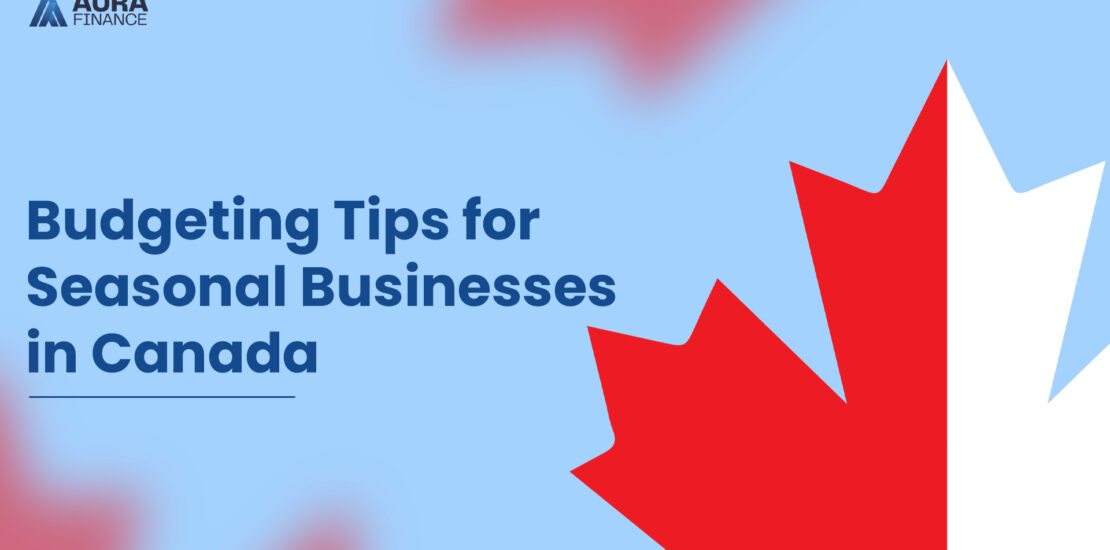- May 29, 2025
- Posted by: Evolvan
- Categories: Accounting, Business plans, Finance & accounting, Tax Audit

Stay Profitable All Year, Even When Business Slows Down
Operating a seasonal business in Canada comes with unique advantages — and unique challenges. While you may enjoy a surge of revenue in peak months, staying afloat during slow seasons often becomes a struggle without a solid financial plan.
Whether you run a landscaping company in Mississauga, a ski rental in Whistler, or a summer café in cottage country, the right budgeting strategies can help you maintain cash flow, manage taxes efficiently, and avoid financial surprises. At Aura Finance, our experienced consultants and Tax Accountants in Toronto specialize in supporting seasonal business owners with personalized financial advice.
Let’s break down essential budgeting strategies tailored for seasonal operations.
🔍 1. Understand Your Revenue Cycle in Detail
The first step in smart budgeting is understanding when and how your business earns.
Analyze your financial data over the past 2–3 years:
- Which months bring in the highest revenue?
- When do sales begin to dip?
- What months bring consistent fixed costs regardless of income?
Once you know your cash flow pattern, create a monthly cash flow forecast — not just an annual one. This helps you predict shortages and plan funding or cost-cutting strategies ahead of time.
👉 Tip from our Tax Accountant in Toronto: Integrate seasonal cash flow forecasting with your HST/GST filing schedule to avoid being short on remittance deadlines.
🧾 2. Separate Fixed and Variable Costs
You can’t control every expense, but you can plan for them.
- Fixed costs (rent, software subscriptions, insurance) must be budgeted for even in low-revenue months.
- Variable costs (staffing, inventory, utilities) can be scaled up or down depending on demand.
By identifying which costs are flexible, you can adjust more easily during slow months — a crucial move for cash preservation.
A Tax Accountant in Toronto can help you categorize expenses properly, ensuring deductions are accurately recorded come tax season.
💸 3. Create a Peak Season Savings Strategy
Many seasonal businesses generate the bulk of their income during just 3–6 months a year. To stay stable, consider this simple yet effective strategy:
✅ During busy months, automatically allocate 20–30% of your profit into a business savings account.
✅ Use this fund to cover essential expenses during the off-season — like loan payments, marketing, or maintenance.
This proactive habit creates a self-sustaining cash buffer so your business can stay open and agile during lean months.
🛠 4. Plan Large Expenses Around Income Cycles
Avoid making large purchases when cash flow is tight. Plan to:
- Purchase or repair equipment during peak months.
- Renew insurance and licenses when revenue is high.
- Delay expansion or upgrades until you’ve built enough reserve.
You should also speak to a Tax Accountant in Toronto about how large expenses — like new vehicles or machinery — can be amortized or depreciated to reduce your tax bill over time.
📦 5. Manage Inventory Wisely
Stocking too much inventory near the end of your season can lead to unsold items, cash flow issues, and excess storage costs.
Instead:
- Forecast demand accurately using historical data.
- Order just enough stock to meet high-season needs.
- Use discounts or bundle offers to clear excess before off-season hits.
A good accountant can help you monitor inventory turnover ratios and suggest the best way to reflect this on your books for tax benefits.
🧑🤝🧑 6. Hire Flexibly: Scale Your Team with the Season
Payroll is often the largest expense for seasonal businesses. Instead of hiring full-time staff:
- Consider seasonal contracts, part-timers, or freelancers.
- Use staffing agencies that specialize in short-term employment.
- Offer performance bonuses instead of fixed monthly raises.
Your Tax Accountant in Toronto can guide you on proper employee classification (vs independent contractors) to avoid CRA penalties.
📲 7. Adopt Digital Tools for Smart Budgeting
Manual budgeting is outdated. Leverage digital tools like:
- QuickBooks or Xero for real-time financial reporting
- Cash Flow Frog for visual forecasting
- Wave for simple bookkeeping solutions
Digital tools allow you to:
- Automate recurring payments
- Set budget alerts
- Generate monthly profit & loss reports
At Aura Finance, we help businesses integrate cloud-based accounting into their operations and train their staff to use it effectively.
🧮 8. Work Closely With a Tax Accountant in Toronto
Budgeting isn’t just about tracking money in and out — it’s about planning around taxes, compliance, and long-term sustainability.
A professional Tax Accountant in Toronto can help you:
- Structure your business to optimize taxes
- Advise on HST/GST collection and remittance
- Create a year-round tax plan that fits your seasonality
- Apply for financing or grants during slow periods
At Aura Finance, our accounting professionals work directly with seasonal business owners to create tailored financial strategies that support growth and reduce tax stress.
🚀 Final Thoughts: Survive and Thrive Year-Round
Seasonal businesses are not doomed to struggle during the off-season. With the right budgeting strategies, cash flow forecasting, and tax planning, you can maintain stability and even grow during your quiet months.
Whether you’re looking to improve your budgeting systems or need expert tax advice, our team at Aura Finance is here to help. Book a free consultation with a trusted Tax Accountant in Toronto today and take control of your business’s financial future.
📞 Need Help Budgeting for Your Seasonal Business?
Let’s talk: aurafinance.ca/contact
